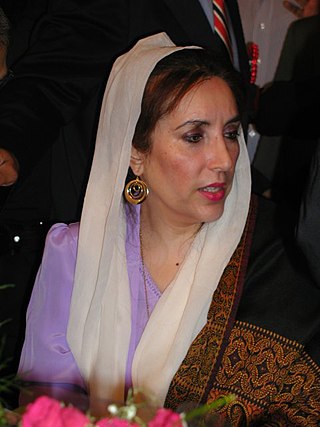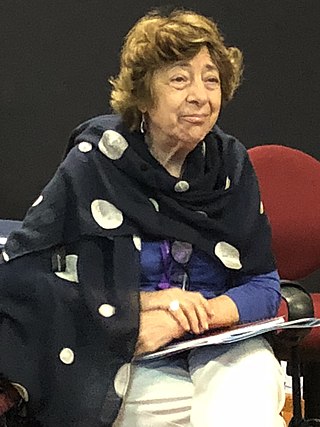Related Research Articles
Saneeya Hussain was a Pakistani journalist and environmentalist. She married a Brazilian man in 1998 and died in Brazil in 2005.

Women in Pakistan make up 48.76% of the population according to the 2017 census of Pakistan. Women in Pakistan have played an important role throughout Pakistan's history and they are allowed to vote in elections since 1956. In Pakistan, women have held high offices including that of the Prime Minister, Speaker of the National Assembly, Leader of the Opposition, as well as federal ministers, judges, and serving commissioned posts in the armed forces, with Lieutenant General Nigar Johar attaining the highest military post for a woman. Benazir Bhutto was sworn in as the first woman Prime Minister of Pakistan on 2 December 1988.

The Center for Women's Global Leadership, based at Rutgers University, was founded in 1989 by Charlotte Bunch, the former executive director and an internationally renowned activist for women's human rights. Executive Director Krishanti Dharmaraj is also the founder of the Dignity Index and co-founder of WILD for Human Rights and the Sri Lanka Children's Fund. The former executive director, Radhika Balakrishnan, is now the faculty director, and a professor in the Department of Women's and Gender Studies at Rutgers, chair of the Board of the US Human Rights Network, and a board member of the Center for Constitutional Rights. Located on Douglass Residential College at Rutgers University, CWGL is a unit of International Programs within the School of Arts and Sciences and is a member of the Institute for Women's Leadership, a consortium of women's programs at Rutgers.
Polygamy in Pakistan is legally permissible, according to the law of 1961, but restricted to Muslim men, who may have a maximum of four wives at one time. However it is illegal for Hindus as per the Hindu marriage law.
Women's Action Forum (WAF) is a women's rights organization in Pakistan.

Farida Shaheed is a Pakistani sociologist and feminist human rights activist. In 2012, she was appointed the United Nations Special Rapporteur in the field of cultural rights, while she held that role in the field of education from 2022. She heads the Shirkat Gah women's resource centre in Pakistan, and is known for her extensive work on gender and class analysis, both in Pakistan and more globally.
Najma Sadeque from Pakistan was a leading woman journalist, author, human rights activist, particularly of women's rights, an artist, an environmentalist, and a painter. She also did research on socioeconomic issues and authored many books and wrote articles. She co-founded Shirkat Gah in 1975, a women's NGO to highlight human rights violations against women. She also co-founded the Women’s Action Forum (WAF), Pakistan.
Feminism in Pakistan refers to the set of movements which aim to define, establish, and defend the rights of women in Pakistan.This may involve the pursuit of equal political, economic, and social rights, alongside equal opportunity. These movements have historically been shaped in response to national and global reconfiguration of power, including colonialism, nationalism, Islamization, dictatorship, democracy, and the War on Terror. The relationship between the women's movement and the Pakistani state has undergone significant shifts from mutual accommodation to confrontation and conflict.

Khawar Mumtaz is a Pakistani women's rights activist, feminist author and university professor. She is the Former Chairperson of the National Commission on the Status of Women (NCSW) who served for three consecutive terms from 2013 to 2019.

Terry M. McGovern is an American public health scholar. She is the Senior Associate Dean for Academic and Faculty Affairs at CUNY Graduate School of Public Health & Health Policy in New York City. McGovern is also Professor of Health Policy and Management.
Foreign aid for gender equality in Jordan includes programs funded by governments or non-governmental organizations (NGOs) that aim to empower women, close gender based gaps in opportunity and experience, and promote equal access to education, economic empowerment, and political representation in the Hashemite Kingdom of Jordan.
Aware Girls is a non-governmental organization in Peshawar, Khyber Pakhtunkhwa, Pakistan. Established in 2002, it aims to address violence and discrimination against women and young girls in Pakistan. Their mission is to advocate for women's rights, education, and access to sexual and reproductive health resources. They state their objective as "to strengthen the leadership capacity of young women enabling them to act as agents of social change and women empowerment in their communities."
The SisterSong Women of Color Reproductive Justice Collective, also known as SisterSong, is a national activist organization dedicated to reproductive justice for women of color.
Fauzia Viqar is a Pakistani human rights activist with a focus on women's rights. She served as the first chairperson of the Punjab Commission on the Status of Women from 2014 to 2019.

Mabel Bianco is an Argentine physician who has devoted her career to fighting for women's access to improved health services and sex education. In 1989, she established the Foundation for Studies and Research on Women, and has continued to serve as its president. She has been an activist in Latin America and the world, introducing policies addressing breast cancer, HIV/AIDS, reproductive rights and gender reform in the UN.
Sanna Ejaz or Sana Ijaz, is a Pakistani journalist and human rights activist from Khyber Pakhtunkhwa. She is a leading member of the Pashtun Tahafuz Movement (PTM), as well as a founding member of the Waak Movement, which aims to bring political awareness among Pashtun women. She focuses on advocacy to promote women's role in peacebuilding, reconciliation, and social activism. She was formerly the vice-president of the youth wing of Awami National Party (ANP).

Hilda Flavia Nakabuye is a Ugandan climate and environmental rights activist who founded Uganda's Fridays for Future movement. She also advocates for greater gender equality and racial diversity in the climate change movement. One of her environmental concerns is saving Lake Victoria, which connects Uganda to neighboring countries. As part of her activism, Nakabuye visits schools and communities to empower more women to join the fight against climate change, stating that "the climate crisis has no borders". She also created Climate Striker Diaries, an online platform to encourage digital awareness about climate change.
Zohra Yusuf is an advertising professional, an activist and a journalist who is lauded for her work in women's rights, human rights and media. She is the former Chairperson of the Human Rights Commission of Pakistan (HRCP).
Shirkat Gah women's resource centre, is a women's rights organization in Pakistan which focuses on research, publications and advocacy on women's issues.

Yasmeen Hassan is a Pakistani-American attorney and international women's rights activist. She served as the Global Executive Director of Equality Now from 2011 to 2022.
References
- ↑ Mirsky, Judith; Radlett, Marty (2000). No Paradise Yet: The World's Women Face the New Century. Zed Books. ISBN 9781856499224.
- 1 2 3 4 5 6 7 "Hilda Saeed (Pakistan) | WikiPeaceWomen – English". wikipeacewomen.org. Retrieved 2019-04-03.
- ↑ "Celebrating Pakistani women of past and present". www.thenews.com.pk. 2017-09-23. Retrieved 2019-04-03.
- 1 2 "Population Planning 2020". The Express Tribune. 2017-07-11. Retrieved 2019-04-03.
- ↑ "Just 'cause you're a woman – a look at women in Pakistan". Radio Netherlands Archives. 1994-03-02. Retrieved 2019-04-03.
- 1 2 Khan, Nichola (2017-07-15). Cityscapes of Violence in Karachi: Publics and Counterpublics. Oxford University Press. ISBN 9780190869786.
- ↑ Waraich, Sukhmani (2015-07-22). "The Story Behind Pakistan's Feminism Of The 70s And 80s". www.vagabomb.com. Archived from the original on 2017-05-07. Retrieved 2019-04-03.
- 1 2 Gul, Ali (2015-08-14). "68 Non-Muslims From Pakistan That Have Made The Country A Better Place". MangoBaaz. Retrieved 2019-04-03.
- ↑ HERA: Health, Empowerment, Rights and Accountability (1995). Women's Sexual and Reproductive Rights and Health: Action Sheets (PDF). International Women's Health Coalition. Archived from the original (PDF) on 3 April 2019. Retrieved 3 April 2019.
{{cite book}}: CS1 maint: multiple names: authors list (link)